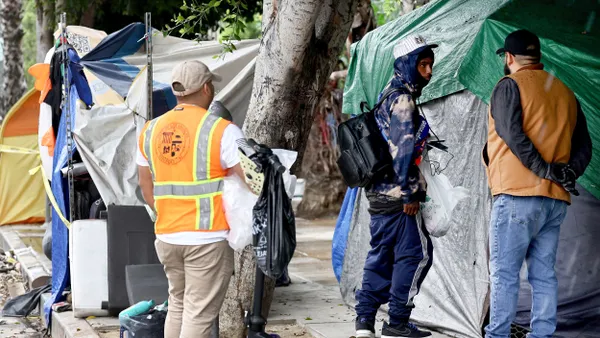Dive Brief:
- As city leaders wrestle with the effects of climate change and the need to hit targets to reduce emissions, some question if they are already running out of time, even as initiatives and programs gather momentum.
- During a World Resources Institute (WRI)-hosted media briefing with city sustainability leaders, some officials expressed concern that it may be too late to deal with the worst effects of climate change — despite aggressive goals to become carbon neutral by 2050, have clean electricity grids and become less reliant on fossil fuels — due to its speed and strain on municipal budgets.
- "To maintain that high level of audience experience as well as the high quality of life for people that are moving to Orlando and maybe trying to escape a worse situation, it's difficult to make the strategic investments in all those different areas," Ian LaHiff, the city of Orlando, FL’s energy project manager, told reporters at the briefing.
Dive Insight:
Time is certainly of the essence when it comes to dealing with the effects of climate change, based on the federal government’s Fourth National Climate Assessment, which warned of impending disaster if the threat is not dealt with. That assessment echoed the findings of the United Nations’ Intergovernmental Panel on Climate Change (UN IPCC), which warned that society has until 2030 to mitigate global warming and keep temperature rises to a maximum of 1.5ºC.
For cities, efforts to combat climate change are largely focused in the transportation and building sectors, with the likes of Boston, Orlando and Minneapolis noting the need to carry out deep energy retrofits. In Boston, that effort is complicated by the sheer number of historic buildings that will need to be retrofitted to keep up with new energy efficiency standards. LaHiff said the $2.5 million annual operational savings Orlando has from its own deep energy retrofit has made it worth it. "You've got to plug the holes in the boat first before you put a new engine on it, so it makes sense to fix a lot of these outstanding issues," he said.
Kim Havey, director of sustainability for Minneapolis, also noted the difficulty in finding an alternative for natural gas — which heats many of the city’s buildings — as the city deals with extreme cold weather, including the recent polar vortex. He said while there are many options on the table, he is “encouraged” by some of the things being explored. "If we can do the efficiency first and reduce our energy use first, then we can do the conversion to electric and then we're able to decarbonize the electric grid,” he said.
It will also mean shifting relationships with utility companies, which are already wrestling with changing business models as they move away from fossil fuel reliance and towards renewable energy like solar and wind. The growth in the use of electric vehicles (EVs) will also contribute to that shift, and while LaHiff said there may be some reluctance on the part of utilities such as Duke Energy to try new things, they are moving in the right direction. "They're not quite there yet as far as the emerging technology ... but they're willing to work with us on a utility-scale solar farm that'll help power one of our waste water treatment plants," he said.
There will be plenty of opportunities for cities to collaborate and learn from each other as they look to combat climate change, including through Bloomberg Philanthropies’ American Cities Climate Challenge and the Bloomberg-backed American Cities Climate Challenge Renewables Accelerator, a collaboration with the Rocky Mountain Institute (RMI), WRI and the Urban Sustainability Directors Network (USDN) to help cities generate more renewable energy capacity.
Despite the work at the city and state level, those present at the briefing said the federal government needs to step up and take more of a leadership role, although they did not say if initiatives like the proposed Green New Deal in Congress would be helpful. Rushad Nanavatty, Principal at RMI, said cities’ desire to push forward regardless of what goes on at the federal level is a "uniquely American story."
"You have communities, some of them very small, some of them large, and individuals, saying, regardless of what our federal government does, we are going to step up and we're going to do the right thing,” Nanavatty said.












